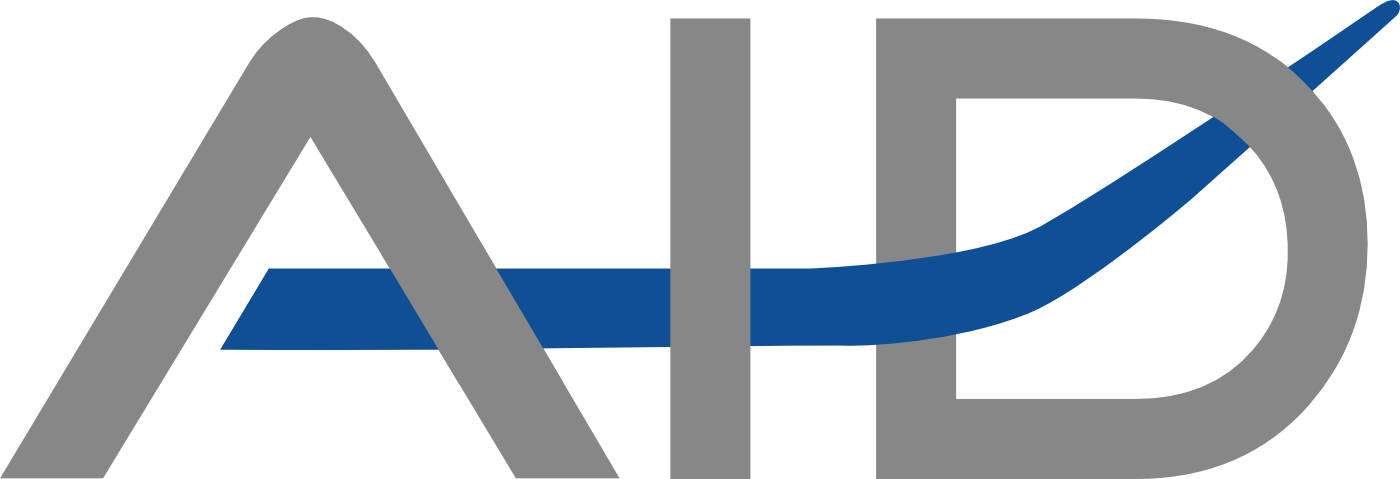Whether your employees need an insight into the basics of the aerospace industry, want to brush up on their existing knowledge or go into more depth on a specific topic – our training courses are tailored to your needs. Delivered by industry experts, the courses are designed to be practical in order to give your employees the relevant insight.
Why choose AID?
Our trainers are engineers and professionals whose day job primarily consists of project work in the industry and who have been selected for their ability to pass on knowledge. Thus, we ensure that the content being taught is always state of the art. The concept of our trainings is based on the interaction between the trainer and the participants. For this reason, our trainers share their personal experience and discuss the specific challenges the participants face. The acquired knowledge is reinforced through group work, where the participants work on typical tasks. Our offers for you are geared to the needs of your company, and we align our content and concepts with your challenges. This ensures that your employees receive exactly the information they need for their daily work. You choose the location, duration, date and scope of the training according to your wishes and needs. We support you in planning your training and, if you wish, we can also assist you with participant management and a training evaluation.
Practical Relevance
Interactive Learning Experience
Needs-based Content
Flexible Organisation
Aviation Regulation Training Courses
The design, production and maintenance of aeronautical products is strictly regulated by international agencies such as the FAA (Federal Aviation Administration) or the EASA (European Union Aviation Safety Agency). Civil aviation companies have to comply with the standards as defined by the EASA legislation in order to operate on the European market. Our training courses are designed to give the participants an understanding of the regulatory framework as well as the ability to navigate the standards that apply to their work.
Aviation Legislation Duration: 2 Days Course Language: DE/EN Course Material: EN Within two days, you will receive all the necessary basics of aviation legislation. You will get to know the international, European and national authorities including their responsibilities and tasks. You will also get an insight into the various aviation organisations in the industry, such as design organisations, production organisations or maintenance organisations. Contents: Download Course Information as PDF file: AID - Aviation Legislation Part 21J - Design Organisation Duration: 2 Days Course Language: DE/EN Course Material: EN The development of aeronautical products is the responsibility of design organisations that have been approved by the EASA. The requirements for these approved design organisations are specified in EU Regulation No. 748/2012 and its amendments. Within two days, you will receive an introduction to the processes, organisational requirements and their commercial implementation required for a design organisation in accordance with EASA Part 21J. Contents: Download Course Information as PDF file: AID - Part21J Design Organisation Part 21G - Production Organisation Duration: 2 Days Course Language: DE/EN Course Material: EN To build and certify aircraft parts manufacturing companies need to hold a Production Organisation Approval. The EASA Part 21 Subpart G of Regulation (EC) No 748/2012 provides the regulatory framework for the approval of Production Organisations. This two-day course provides an introduction to European Aviation laws, as well as an understanding of the regulatory tasks and responsibilities of a Production Organisation. Contents: Download this Course Information as PDF file: AID - Part21G Production Organisation
Aviation Legislation
Part 21J - Design Organisation
Part 21G - Production Organisation
Get in Touch for a non-binding enquiry
Call us now +49 8856 903 45 30
Quality Management Training Courses
Across industries, companies design and implement Quality Management Systems to improve their internal workings, increase their efficiency and their customer satisfaction. Our Quality Management Training Courses help our clients establish the processes they need, in order to maintain a working Quality Management System. The courses are appropriate for professionals with any level of experience.
EN 9100 - Quality Management in Aviation Duration: 1 Day Course Languages: DE/EN Course Material: EN The EN 9100 standard “Quality Management Systems - Requirements for Aviation, Space and Defense Organisations” is an expansion of the ISO 9001 “Quality Management Systems – Requirements” standard, which is adapted for the special requirements regarding quality and safety in the aerospace industry. Contents: Download this Course Information as PDF file: AID - EN 9100 - Quality Management in Aviation
EN 9100 - Quality Management in Aviation
In this training participants will be made aware of Quality Management practices, learn to identify the core requirements of the EN 9100 standard and how to apply these requirements to their organisations working practices.
Get in Touch for a non-binding enquiry
Call us now +49 8856 903 45 30
Engineering Training Courses
Design in the aerospace industry is characterised by safety and reliability. To demonstrate compliance with certification requirements, technical standards for system development, safety considerations as well as software and hardware development have become established. Our engineering training courses give participants a deeper understanding of these standards.
ARP4754A - Civil Aircraft and Systems Development Duration: 2 Days Course Language: DE/EN Course Material: EN SAE Aerospace Recommended Practice - ARP4754A provides guidelines for the development of an aircraft and aircraft systems considering the overall aircraft operating environment and functions. This includes validation of requirements and verification of the design implementation for certification and product assurance. Participants of this training get an insight of the processes of ARP4754A and are guided through it using appropriate examples and exercises of developing an aircraft and its systems. Contents: Download this Course Information as PDF file: AID - ARP4754A - Civil Aircraft and Systems Development ARP4761 - Safety Assessment Process on Civil Airborne Systems and Equipment Duration: 2 Days Course Language: DE/EN Course Material: EN SAE Aerospace Recommended Practice ARP4761 provides guidelines and methods for performing safety assessments for the certification of civil aircraft. The concept of Aircraft Level Safety Assessment will be introduced and the tools to accomplish this task are outlined. Participants of this training get an insight into the processes of ARP4761 and learn how to conduct a safety assessment consisting of a Functional Hazard Assessment, Preliminary System Safety Assessments and System Safety Assessments. Participants also learn the methods needed to conduct a safety assessment, including Fault Tree Analysis, Dependence Diagram, Markov Analysis, Failure Modes and Effect Analysis, Failure Modes and Effects Summary and Common Cause Analysis. Contents: Download this Course Information as PDF file: AID - ARP4761 – Safety Assessment Process on Civil Airborne Systems and Equipment DO-178C - Software Development in Aviation Duration: 2 Days Course Language: DE/EN Course Material: EN RTCA DO-178C “Software Considerations in Airborne Systems and Equipment Certification” is the accepted standard for civil aviation software development and certification. Compliance with its objectives is the primary way to meet regulatory requirements and obtain approval by the regulatory authorities for airborne software. This two-day training provides detailed knowledge for many details of Software Development according to the DO-178C guidelines and an understanding of the underlying methods. Groupworks and hand on tasks reinforce the acquired knowledge throughout the course. Contents: Download this Course Information as PDF file: AID - DO-178C - Software Development in Aviation DO-254 - Electronic Hardware Development Duration: 2 Days Course Language: DE/EN Course Material: EN RTCA DO-254 “Design Assurance Guidance for Airborne Electronic Hardware” is the accepted standard for civil aviation electronic hardware development. It is recognized as a mean of compliance by the regulatory authorities for the design assurance of electronic hardware in airborne systems. This two-day course provides the necessary knowledge to get started with electronic hardware development in aviation. Contents: Download this Course Information as PDF file: AID - DO-254 - Electronic Hardware Development
ARP4754A - Civil Aircraft and Systems Development
ARP4761 - Safety Assessment Process on Civil Airborne Systems
Dependence Diagram (DD) and
Markov Analysis (MA)
DO-178C - Software Development in Aviation
DO-254 - Electronic Hardware Development
Get in Touch for a non-binding enquiry
Call us now +49 8856 903 45 30
General Training Courses
Who is responsible for a plane crash? What is the impact of human factors? Why is human failure the biggest contributor to aviation accidents? Our General Training Courses answer questions that don’t fit in general categories, but are important for modern Aerospace professionals.
Human Factors in Aviation Duration: 1 Day Language: DE/EN The term "human factor", also "human influencing factor", is a collective term for psychological, cognitive and social influencing factors in socio-technical systems and human-machine systems. In aviation in particular, the interaction between people and technology plays a very important role. Knowing people's capabilities and performance limits is an essential prerequisite for avoiding mistakes. Contents: Download this Course Information as PDF file: AID - Human Factors in Aviation (Personal) Liability in Aviation Duration: 1 Day Language: DE/EN Legal processing of aviation accidents usually takes years to complete. The investigations do not only stay on the surface, but go deep into operational structures and responsibilities. This training shall give you an overview of operational liabilities, as well as of personal liabilities of employees and shall help you to understand the context of international aviation law. Contents: Download this Course Information as PDF file: AID - (Personal) Liability in Aviation
Human Factors in Aviation
(Personal) liability in Aviation




